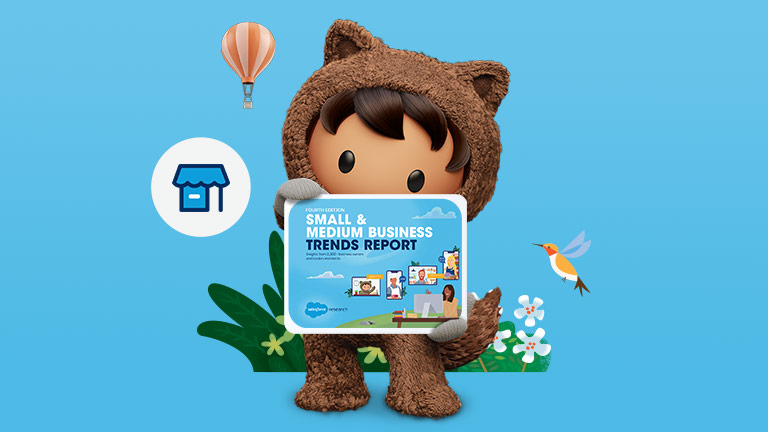In an unpredictable climate where remote working is on the rise and decision making needs to be data-driven, SMEs that aren’t digitally mature are facing an uphill struggle. When the future is unknowable, business intelligence is critical. When global supply chains are disrupted, visibility is vital. And when workforces are operating from kitchens and couches around the world, staying connected isn’t optional – it’s imperative. But help is on the way. AI for small businesses can enable SMEs to make better decisions, empower workers and gain visibility into every corner of the globe.
Let’s look at how AI for small business can help SMEs prepare for success in the next normal and beyond.
What is AI?
Artificial intelligence – or machines that can perform tasks and processes that once required human intelligence – has been a popular cultural subject for decades.
Today, AI is being used to help businesses connect with their customers. It’s powering voice assistants in your pocket, and farmers maximise crop yields. It’s turbocharging scientists in their hunt to eradicate childhood diabetes and aiding in the battle against disinformation. And that’s just the tip of the iceberg when it comes to the benefits of AI.
Some advantages of AI for small businesses
The concern over technological employment has led to a lot of hand wringing, but the fact is, AI is most effective when helping workers, not replacing them. The future of small business depends on innovation and working smarter. AI is the great enabler.
Here are some of the benefits that AI for small business can offer today’s SMEs.
Streamlined processes. SMEs can free up their teams to focus on higher-value, more creative work by automating routine tasks. This drives productivity and leads to better service, and increases worker satisfaction.
A turbocharged workforce. A PwC report predicts that AI will result in a 14% boost in global GDP by 2030. It also reports that improvements in labour productivity will account for 55% of those GDP gains.
Exceptional customer service. Customer expectations for fast and personalised service increased dramatically in the wake of the pandemic. AI for small businesses can help SMEs deliver outstanding personalised service at scale.
Increased revenue. AI can predict cross-selling and upselling opportunities and deliver the right messaging to the right customer at the right time. It can also help SMEs identify and capitalise on the demand for new products and services.
Better visibility. As the world struggles to manage unpredictable supply chains, the increased operational visibility provided by AI has become critical. AI can also analyse volumes of data to support better decision making when navigating supply-chain disruptions.
Four ways that today’s small businesses are leveraging AI
So now that we’ve seen some of the benefits of artificial intelligence for small business, let’s take a look at how SMEs are using AI.
Deploying chatbots. Offering self-service options is a win/win for companies and their customers. Customers are afforded the opportunity to quickly resolve simple issues without engaging with reps, while reps can focus on more complex problems.
Delivering relevant recommendations. What do Amazon, Netflix, Facebook, Tinder and YouTube have in common? Robust recommendation systems. AI can help SMEs offer recommendations that drive engagement and surface new selling opportunities.
Improving products and services. AI can be useful for turning data into actionable information. By leveraging analytics, SMEs can see where products and services fall short and understand how to create better products. For instance, AI-driven insights are helping to create vertical farms to provide healthier food in urban areas.
Tailoring market campaigns. The old days of huge (and hugely expensive) billboards are long gone. Today, even the smallest business can reach billions of potential customers. To do this effectively, they need to offer the kind of intelligent, fast and personal marketing campaigns that AI can help deliver.
AI is energising industries and reimagining the future
The applications of artificial intelligence are nearly limitless, and so are the industries that can benefit from AI for small business. AI is already revolutionising everything from travel and finance to human resources and law.
Retailers are using AI to optimise stock and improve the self-checkout process. Soon, robotic assistants may be helping point customers in the right direction, while AI-driven promotions are delivered to apps on the phones of in-store shoppers.
Sales departments are turning to AI to improve nearly every part of the sales process. AI can help generate and qualify leads, provide personalised communications and suggest the next best actions. CRM systems already analyse customer data granularly, helping sales reps understand buying behaviour and predict customer needs.
Marketing teams depend on AI to provide exceptional customer experiences and segment their audience. AI can also help email marketers determine which headlines have the highest open rates, what keywords drive engagement, and what CTAs lead to conversion. There are even AI tools that can scan marketing emails and suggest improvements based on data-backed insights.
Business leaders use AI to sift through mountains of raw data and turn it into information. This information can then be used to make better decisions. Today’s SME leaders can no longer be running on hunches – these hunches have to be supported by data. The disruptive business intelligence that AI offers may even change the nature of leadership.
Accounting is perhaps the function that’s perhaps most affected by AI at the moment. After all, most accounting processes are repetitive, mundane and rule-based – precisely the kind of tasks that AI excels at. And while AI is generally best suited for augmenting human workers, there’s a genuine possibility that accounting will be automated in the future.
Healthcare, on the other hand, is a sector where AI can go far beyond the mundane to offer truly revolutionary applications. Think personalised healthcare, robotic surgeons, at-home diagnostic tools, and analytic machines programmed with oceans of data and a single purpose: to eradicate a disease.
While some of AI’s applications are routine and others are mind-blowing, it’s important to remember the function of AI: to make our lives better.
By offering intelligent insights, AI can enable us to work smarter. By automating mind-numbing tasks, it can enable us to live better. By being aimed at a single purpose, it can help us live longer. And by empowering decentralised workforces with intelligent tools, it can bring us closer together.
To see how AI can help your SME connect with the customer and build business intelligence, download a free copy of Your Complete CRM Handbook.







